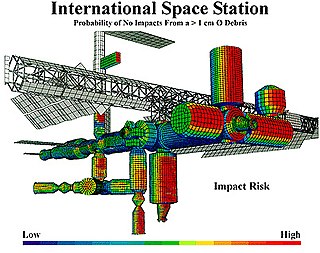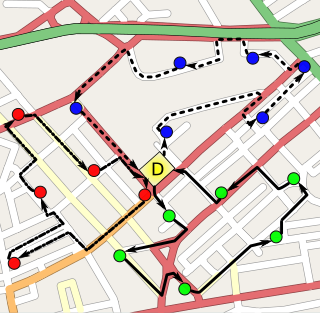
Research is "creative and systematic work undertaken to increase the stock of knowledge". It involves the collection, organization and analysis of evidence to increase understanding of a topic, characterized by a particular attentiveness to controlling sources of bias and error. These activities are characterized by accounting and controlling for biases. A research project may be an expansion on past work in the field. To test the validity of instruments, procedures, or experiments, research may replicate elements of prior projects or the project as a whole.

Risk management is the identification, evaluation, and prioritization of risks followed by coordinated and economical application of resources to minimize, monitor, and control the probability or impact of unfortunate events or to maximize the realization of opportunities.
Operations research, often shortened to the initialism OR, is a discipline that deals with the development and application of analytical methods to improve decision-making. The term management science is occasionally used as a synonym.
Systems analysis is "the process of studying a procedure or business to identify its goal and purposes and create systems and procedures that will efficiently achieve them". Another view sees system analysis as a problem-solving technique that breaks down a system into its component pieces, and how well those parts work and interact to accomplish their purpose.

Marketing is the process of exploring, creating, and delivering value to meet the needs of a target market in terms of goods and services; potentially including selection of a target audience; selection of certain attributes or themes to emphasize in advertising; operation of advertising campaigns; attendance at trade shows and public events; design of products and packaging attractive to buyers; defining the terms of sale, such as price, discounts, warranty, and return policy; product placement in media or with people believed to influence the buying habits of others; agreements with retailers, wholesale distributors, or resellers; and attempts to create awareness of, loyalty to, and positive feelings about a brand. Marketing is typically done by the seller, typically a retailer or manufacturer. Sometimes tasks are contracted to a dedicated marketing firm or advertising agency. More rarely, a trade association or government agency advertises on behalf of an entire industry or locality, often a specific type of food, food from a specific area, or a city or region as a tourism destination.
Marketing research is the systematic gathering, recording, and analysis of qualitative and quantitative data about issues relating to marketing products and services. The goal is to identify and assess how changing elements of the marketing mix impacts customer behavior.
An information system (IS) is a formal, sociotechnical, organizational system designed to collect, process, store, and distribute information. From a sociotechnical perspective, information systems are composed by four components: task, people, structure, and technology. Information systems can be defined as an integration of components for collection, storage and processing of data of which the data is used to provide information, contribute to knowledge as well as digital products that facilitate decision making.
In the field of management, strategic management involves the formulation and implementation of the major goals and initiatives taken by an organization's managers on behalf of stakeholders, based on consideration of resources and an assessment of the internal and external environments in which the organization operates. Strategic management provides overall direction to an enterprise and involves specifying the organization's objectives, developing policies and plans to achieve those objectives, and then allocating resources to implement the plans. Academics and practicing managers have developed numerous models and frameworks to assist in strategic decision-making in the context of complex environments and competitive dynamics. Strategic management is not static in nature; the models can include a feedback loop to monitor execution and to inform the next round of planning.
Managerial economics is a branch of economics involving the application of economic methods in the organizational decision-making process. Economics is the study of the production, distribution, and consumption of goods and services. Managerial economics involves the use of economic theories and principles to make decisions regarding the allocation of scarce resources. It guides managers in making decisions relating to the company's customers, competitors, suppliers, and internal operations.
Computational science, also known as scientific computing, technical computing or scientific computation (SC), is a division of science that uses advanced computing capabilities to understand and solve complex physical problems. This includes

Grounded theory is a systematic methodology that has been largely applied to qualitative research conducted by social scientists. The methodology involves the construction of hypotheses and theories through the collecting and analysis of data. Grounded theory involves the application of inductive reasoning. The methodology contrasts with the hypothetico-deductive model used in traditional scientific research.

The Open Group Architecture Framework (TOGAF) is the most used framework for enterprise architecture as of 2020 that provides an approach for designing, planning, implementing, and governing an enterprise information technology architecture. TOGAF is a high-level approach to design. It is typically modeled at four levels: Business, Application, Data, and Technology. It relies heavily on modularization, standardization, and already existing, proven technologies and products.

Design management is a field of inquiry that uses project management, design, strategy, and supply chain techniques to control a creative process, support a culture of creativity, and build a structure and organization for design. The objective of design management is to develop and maintain an efficient business environment in which an organization can achieve its strategic and mission goals through design. Design management is a comprehensive activity at all levels of business, from the discovery phase to the execution phase. "Simply put, design management is the business side of design. Design management encompasses the ongoing processes, business decisions, and strategies that enable innovation and create effectively-designed products, services, communications, environments, and brands that enhance our quality of life and provide organizational success." The discipline of design management overlaps with marketing management, operations management, and strategic management.

Enterprise modelling is the abstract representation, description and definition of the structure, processes, information and resources of an identifiable business, government body, or other large organization.
Business economics is a field in applied economics which uses economic theory and quantitative methods to analyze business enterprises and the factors contributing to the diversity of organizational structures and the relationships of firms with labour, capital and product markets. A professional focus of the journal Business Economics has been expressed as providing "practical information for people who apply economics in their jobs."
Innovation management is a combination of the management of innovation processes, and change management. It refers to product, business process, marketing and organizational innovation. Innovation management is the subject of ISO 56000 series standards being developed by ISO TC 279.
Richard Veryard FRSA is a British computer scientist, author and business consultant, known for his work on service-oriented architecture and the service-based business.
Business process management (BPM) is the discipline in which people use various methods to discover, model, analyze, measure, improve, optimize, and automate business processes. Any combination of methods used to manage a company's business processes is BPM. Processes can be structured and repeatable or unstructured and variable. Though not required, enabling technologies are often used with BPM.
A marketing information system (MIS) is a management information system (MIS) designed to support marketing decision making. Jobber (2007) defines it as a "system in which marketing data is formally gathered, stored, analysed and distributed to managers in accordance with their informational needs on a regular basis." In addition, the online business dictionary defines Marketing Information System (MKIS) as "a system that analyzes and assesses marketing information, gathered continuously from sources inside and outside an organization or a store." Furthermore, "an overall Marketing Information System can be defined as a set structure of procedures and methods for the regular, planned collection, analysis and presentation of information for use in making marketing decisions."

Applied mathematics is the application of mathematical methods by different fields such as physics, engineering, medicine, biology, finance, business, computer science, and industry. Thus, applied mathematics is a combination of mathematical science and specialized knowledge. The term "applied mathematics" also describes the professional specialty in which mathematicians work on practical problems by formulating and studying mathematical models.






